Elegy for the Floater
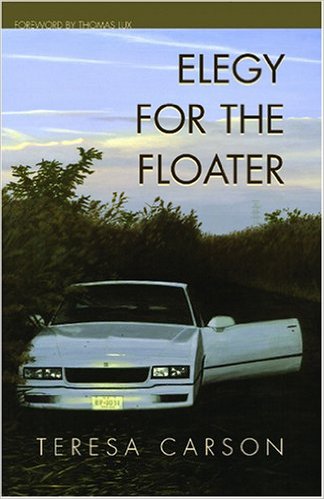
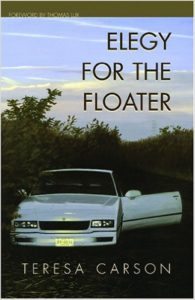 by Teresa Carson,
by Teresa Carson,
CavanKerry Press, 2008,
84 pages, paper, $16,
ISBN -10: 978 -1- 033880 – 07- 05
Buy the Book
Suicide is never easily handled whether in life or in art. While Teresa Carson titles her collection for the section she demarcates as the “Elegy” portion of the manuscript, much more appears in these pages — it reads as a chronicle of how the experience of her brother’s suicide culminated in an exploration of family history. She doesn’t flinch when turning the sharp edge of her short, blunt lines upon her brother’s psychosis, her mother’s crippling depression, her father’s infidelity. Neither does she spare
herself — her own risky choices (drugs, hitchhiking, affairs) are exposed alongside her family’s failings and dysfunction.
Because she is so forthcoming, Carson makes a space with this manuscript where humanity is the prized possession: it is the thing you must admit to before proceeding. “Stop” (11), the last poem in the “Elegy” section — is a confessional where Carson whispers her relief at her brother’s death. This admission launches a reader into a world where her desire for her mother’s praise in “My Mother Said” and her pleasure at her rapist’s painful death can be gazed upon in close proximity and because it is handled so frankly, a reader can watch the story unfold without judgment, instead standing in Carson’s place as she orients you to the darkest moments and questions that have followed her all of her life.
At moments, the collection seems disorganized, but the order is definitely by design — Carson has made the collection into an echo chamber, details and themes from disparate poems bouncing off one another, adding layers of meaning at each point of contact. A string of poems near the middle of the book address sexual experiences that occurred during her adolescence and young adulthood. In “Kathy 1969” (29), Carson writes from the perspective of someone blithely confident enough get entangled with a married man who’s sleeping with her friend — and in the poem immediately following describes the experience of this same man raping her, “Dog Guards Bed” (30). The genius of the poems is that they stand on their own, but write in each other’s margins and between each other’s lines to add entirely new dimensions and remembrances to the reader’s experience.
Through her brother’s suicide, Carson is able to put a point on so many other experiences of her own that this collection ends up blurring the line between poetry and memoir — poemoir,
perhaps — in a most essential way. These poems may have been difficult to unearth in the honest and lucid way in which they are presented, but they are readily admitted and no less arresting for the effort, emerging unfaded, even after years and several lives lived, from the connective tissues where pain and memory are stored.
— Meghan Cadwallader
The Great Hunger
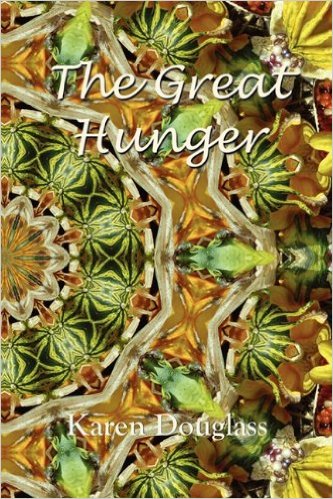
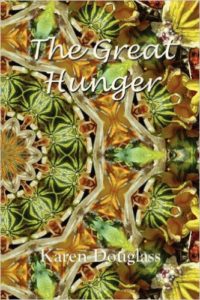 by Karen Douglass,
by Karen Douglass,
Plain View Press, 2009,
81 pages, paper, $13.46,
ISBN -10: 0 – 9818731- 6 – 6
Buy the Book
In her preface to her book of poems, The Great Hunger, Karen Douglass says, “We are eating ourselves and the world to death” (7). Her poems are windows on the ever – lengthening food chain to which we are shackled and they lead the reader from everyday views of our own kitchen tables and farmers’ markets to vantage points we may have trouble accessing — the plight of the undocumented migrant worker in the fields and or the picture of the entire world from above in which the poet traces the paths our food takes from field or pasture to our tables.
While she’s angry at Monsanto (22) and at having to “[forage] for crumbs from the wide vests of CEOs” (15), she acknowledges her own role — in fact, most of the collection rings with a shame at her own complicity in the processes she decries. While she appeals to our shared experiences, evoking the industry and connectedness one feels at a farmer’s market in, “Thirteenth Street Market” (64), even then there’s a desperation mingling with that sense of useful participation in a community: she’s not shopping just for her own table and her own salvation, but for ours as well — the health of the world and its citizens rests on the purchases she makes that Saturday morning. This fear of judgment marks her observations in “Bloodline” (14) as well as she considers how a processed existence is colorless, transporting the speaker further from nature. Here she leaves the end of the poem unpunctuated to suggest the unknown of what kind of an earth will be bequeathed to the next generation; eyes that see “the underside of things” are sealing the bloodline in a continual circle, not wishing to betray the white existence that began the poem.
This kind of thoughtful layering marks many of Douglass’ poems. “Dear Trout” (25) begins with a self – absorbed request to be fed and concludes just seven lines later with a supplication to the same fish she would have eaten, now asking him to teach her how to swim, acknowledging the natural world has much to tell us about living responsibly, usefully — encapsulating the concept in the economical, deliberate way she presents the poem. Although some of her language is a little shopworn,“gold coat[ing] the many roads to hell” (67), Douglass has other instruments in her arsenal to move her poems along as in “Value Added,” where the line breaks create a playful pace at which to trip through abstractions and images. And she is happy to use ironic humor to lighten the grim picture — in “I Want to Eat” (33), she writes that she wants “one raw carrot.” The reality of how unnatural the process by which she comes to that carrot is raw in itself and we continually encounter wordplay wrapped in a very alert conscience in these poems. But beyond her own sense of responsibility, Douglass displays both an uncertainty and thankfulness in “What’s Here” (69) that doesn’t appear in her other poems, illuminating yet another facet of our complex relationship with food.
The joy of this collection is in its variety — the specificity of salsa, the generality of supermarkets and mass -produced products. It is playful in its movement between subjects, but careful in its contemplation of the choices we must make, shedding a new and glaring light on how to decide what’s for dinner.
— Meghan Cadwallader
Hearth
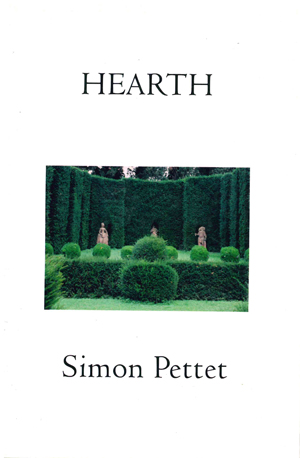
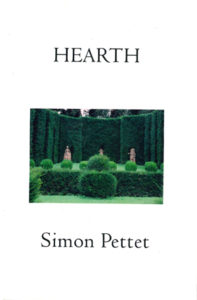 by Simon Pettet
by Simon Pettet
Talisman House Publishers, Jersey City, New Jersey, 2008,
178 pages, paper, $17.95,
ISBN: 978–1–58498–061–2
Buy the Book
“I’m a madman poet and I / love my psychiatric nurse.” So goes the first stanza of the poem, “Poem.” Many poems in this volume, which, as the poet Alice Notley said, “The complete
works — so far — of contemporary American and British poetry’s most meticulous craftsperson,” are simply titled “Poem,” in the manner of a visual artist who merely names his pieces “Untitled.”
Many poems have an art house filmic quality to them, as if stills from a film without any real defining narrative plot were plucked from the viewer’s memory and projected upon a blank screen, or in the case of Pettet, a blank page. These poems are full of unresolved notions and observations that pique the reader’s interest in how the poem might end or why it might not, drifting off open–ended, waiting for us to surmise:
the music
loud the t.v.
on and downstairs
someone cooking
something
Think of a linear string of non–sequiturs eventually forming a circle to make perfect sense. (I’m reminded of a refrain from a favorite song of mine, Chelsea Hotel, by Alejandro Escovedo: “And it makes no sense / And it makes perfect sense.”) Notice how this happens in this poem: “The telepathic schizophrenic / Who suddenly appears / in Doctor Ehrenwald’s office // Is not the same as the / Tall thin West African / Who rapped upon your door, dear, Tuesday morning // Discoursing on science–fiction haiku / And promising the secrets / of Pythagorian mathematics // (that was someone else).” (10)
There’s a multitude of imagistic gems to be found among these poems, such as this first stanza from the poem, “Two Poems For Frank Sherlock”: “As the lightning bolt strikes the snow, / the little mountain goat (with the bell / fastened around its neck) / rings.”
Most of the poems are short and many possess a haiku sensibility. Take the poem, “The Hermit”: “The elderly, bearded, cloak– / ed figure with the lamp // and the downcast face / moves gingerly / over the stony ground.”
Pettet’s poems are a pleasure to read — full of humor, wit, koanish confoundations, and abundant with a masterful and deft sense of spacing and line breaks. I leave you with some lines from the top left corner of page 55: “In brown smoke stain / I summon the spirit of Paul Verlaine / Crouched at a corner table / Fixated upon an absinthe label.”
— Wayne Atherton
Safe Harbor: Port Veritas Poetry Anthology Volume I
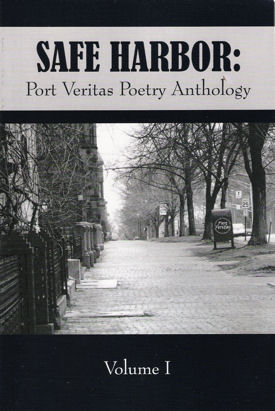
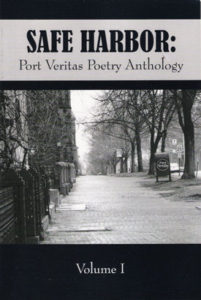 ed. Nate Amadon, Moon Pie Press, 2008,
ed. Nate Amadon, Moon Pie Press, 2008,
84 pages, paper, $12,
ISBN: 978–1–60643–187–0
Buy the Book
It is impossible for most poets who teach in the academy, such as myself, to read this volume of visceral performance poetry from Portland, Maine’s vibrant café scene and not feel the old clichés lurking in the shadows. Can performance poetry ever truly work on the page? Does performance poetry need to work on the page? Is an anthology featuring the work of performance poets attempting to serve as an independent volume of verse or as an artifact of lived experience? It is unfair to ask any one collection to bear the burden of these questions, but they are questions worth asking as one reads Safe Harbor, an anthology that never runs short on pathos but occasionally suffers from egoism and a rollicking looseness that mars its weaker selections.
What is most consistent from poet to poet is a damn–the– torpedoes approach that places any subject, no matter how taboo or revealing, under the microscope of poetry. From the bungled wars in Afghanistan and Iraq, to the crippling failure of our public schools, to our draconian adherence to gender stereotypes, the Port Veritas confederacy employs hyperbole and metaphor to great result. Seen in this light, then, these poets are nobly striving to return poetry to its origin as a hybrid of speech and song that, rather than being sanctified, is vivacious, participatory, and didactic. The problem that results, unfortunately, is that other hallmark slam techniques can be so bombastically overused that it becomes difficult to take some of these poems seriously, as is the case with the most cartoonish hip–hop. After all, how many times can a poet rhyme about AK–47 clips in a single stanza?
In the end, though, Safe Harbor is less concerned about aesthetic debates than it is in expressing the range, candor, and tenacity of the Port Veritas community, and it surely accomplishes this and more.
— Adam Tavel


